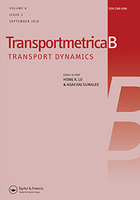
Transportmetrica B-Transport Dynamics
Scope & Guideline
Empowering Researchers in Transport Innovation
Introduction
Aims and Scopes
- Traffic Flow Dynamics:
Research on the behaviors and interactions of vehicles in different traffic scenarios, including the study of car-following models, traffic congestion, and dynamic traffic assignments. - Modeling and Simulation:
Utilization of advanced modeling techniques and simulation frameworks to analyze transportation systems, including multi-agent models and deep learning approaches for predicting traffic patterns. - Public Transportation Systems:
Exploration of public transport dynamics, including optimization of routes, scheduling, and demand-responsive transit systems to improve service efficiency and user experiences. - Safety and Risk Assessment:
Investigation of safety dynamics in transportation networks, focusing on crash risk prediction, traffic conflict analysis, and the development of safety assessment frameworks. - Emerging Technologies in Transportation:
Analysis of the impact of connected and automated vehicles, electric vehicles, and other emerging technologies on transportation systems and dynamics. - Sustainable Transportation Solutions:
Research on environmentally-friendly practices in transportation, including optimization frameworks for road pricing, energy consumption reduction, and integration of sustainable modes of transport.
Trending and Emerging
- Data-Driven Approaches:
There is a growing emphasis on utilizing large datasets and machine learning techniques to inform transportation modeling, prediction, and optimization, showcasing a shift towards data-centric methodologies. - Connected and Automated Vehicles (CAVs):
Research on the implications and dynamics of connected and automated vehicles is on the rise, reflecting the industry's shift towards automation and the integration of smart technologies in traffic management. - Sustainable Transportation Practices:
The journal is increasingly focusing on studies that address sustainability in transportation, including electric vehicle integration, eco-driving strategies, and sustainable urban mobility solutions. - Resilience and Robustness in Transportation Systems:
Emerging themes include the resilience of transportation networks in the face of disruptions, such as natural disasters or pandemics, highlighting the need for robust planning and response strategies. - Interdisciplinary Research Approaches:
There is a trend towards interdisciplinary research combining elements from urban planning, economics, and environmental science to address complex transportation challenges comprehensively.
Declining or Waning
- Traditional Traffic Management Strategies:
There is a noticeable decline in studies centered around conventional traffic management strategies, such as fixed-time signal control, as more adaptive and data-driven approaches gain traction. - Static Demand Forecasting Models:
Research utilizing static models for demand forecasting in transportation has decreased, giving way to dynamic and machine learning-based approaches that account for real-time variability. - Non-Integrated Transportation Studies:
The focus on isolated studies that do not integrate various transportation modes or systems is waning, as the trend shifts towards more holistic and interconnected transportation research. - Human Factor Studies in Traffic:
While human factors remain important, the volume of research solely dedicated to behavioral studies in traffic settings has diminished as technology-driven analyses become more prevalent. - Basic Infrastructure Studies:
There is a decrease in publications focusing solely on basic infrastructure improvements without integrating advanced technologies or data-driven methodologies.
Similar Journals
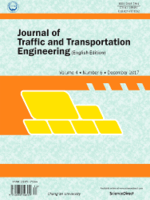
Journal of Traffic and Transportation Engineering-English Edition
Exploring New Horizons in Traffic Management and Transportation Studies.Journal of Traffic and Transportation Engineering-English Edition, published by KEAI PUBLISHING LTD, is a leading open-access journal that has been disseminating valuable research in the realms of civil and structural engineering, as well as transportation studies since 2014. With a robust impact factor reflected by its prestigious Q1 rankings in both Civil and Structural Engineering and Transportation, this journal stands at the forefront of innovation and scholarship, featuring contributions from experts across the globe. The journal is particularly noted for its practical and theoretical advancements in traffic and transportation engineering, making it indispensable for researchers, industry professionals, and students aiming to deepen their understanding of these critical fields. Dedicated to providing a platform for high-quality interdisciplinary research, the Journal of Traffic and Transportation Engineering embraces the principles of open access, ensuring that all published articles are freely available to foster knowledge sharing and collaboration within the community. With its headquarters located in Beijing, China, the journal continues to push boundaries and set new standards in the field of traffic and transportation research.

Journal of Transportation Engineering Part A-Systems
Connecting Knowledge with Practice in Transportation EngineeringThe Journal of Transportation Engineering Part A-Systems, published by the American Society of Civil Engineers (ASCE), is a cutting-edge, peer-reviewed journal dedicated to the advancement of knowledge in the field of transportation systems. With an ISSN of 2473-2907 and an E-ISSN of 2473-2893, this journal serves as a crucial resource for researchers, professionals, and students interested in the intricate interplay between civil engineering and transportation networks. Boasting a Q2 ranking in both the Civil and Structural Engineering and Transportation categories, this journal reflects the high-quality research contributing to these vital disciplines. Accessible through open-access options, the journal provides a platform for innovative ideas and research findings from 2017 to 2024, aiming to address contemporary challenges in transportation systems while fostering interdisciplinary collaboration. As an essential outlet for scholarly work in the United States and beyond, the Journal of Transportation Engineering Part A-Systems is committed to enhancing the understanding of complex transportation dynamics and the development of sustainable and efficient infrastructures.
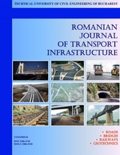
Romanian Journal of Transport Infrastructure
Empowering Transportation Insights for Global ImpactWelcome to the Romanian Journal of Transport Infrastructure, a premier publication dedicated to advancing knowledge in the field of transport infrastructure engineering and management. Published by SCIENDO, this open access journal has been committed to sharing significant research and developments since 2012, ensuring that vital information is readily available to the global academic community. The journal's ISSN is 2286-2218, and it provides a platform for researchers, professionals, and students to collaborate and disseminate findings related to transport systems planning, design, construction, and maintenance. The Romanian Journal of Transport Infrastructure aims not only to contribute to scholarly literature but also to influence policy and practice related to transportation challenges. Our editorial team strives to maintain high standards of academic rigor and relevance, making this journal an essential resource for anyone involved in the transport infrastructure sector.

PROCEEDINGS OF THE INSTITUTION OF CIVIL ENGINEERS-TRANSPORT
Connecting Research and Practice in Transportation EngineeringPROCEEDINGS OF THE INSTITUTION OF CIVIL ENGINEERS-TRANSPORT, published by Emerald Group Publishing Ltd, is a vital scholarly journal dedicated to advancing knowledge in the fields of civil and structural engineering and transportation. With an ISSN of 0965-092X and an E-ISSN of 1751-7710, this journal has been a cornerstone of academic discourse since its inception in 1992, providing a platform for innovative research and case studies up until 2024. Although it currently holds a Q4 quartile ranking in both Civil and Structural Engineering and Transportation categories, its content aims to bridge gaps in existing literature, making it a relevant source for researchers, professionals, and students alike. The journal offers an array of insightful articles that contribute to the evolution of engineering practices and transportation methodologies, fostering a global dialogue among industry stakeholders. While it operates under a subscription model, the journal remains committed to enhancing public access to pivotal findings in engineering disciplines, driving forward the agenda of sustainable and efficient infrastructure development.
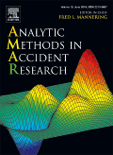
Analytic Methods in Accident Research
Enhancing public safety with rigorous analytic approaches.Analytic Methods in Accident Research, published by ELSEVIER, is an esteemed journal dedicated to the rigorous exploration of methodologies in safety research and transportation studies. Established in 2014, the journal serves as a vital platform for researchers, practitioners, and policymakers focusing on innovative approaches to accident analysis, ultimately aiming to enhance public safety and improve transportation systems. With an impressive impact factor reflected in its Q1 rankings in both Safety Research and Transportation, the journal ranks #1 out of 109 in Safety Research and #2 out of 141 in Transportation, showcasing its influential position within these fields. The journal emphasizes open access to a range of articles, making cutting-edge research accessible to a diverse audience. As it converges toward its 2024 milestone, Analytic Methods in Accident Research continues to play a crucial role in fostering innovative findings and solutions, making it an indispensable resource for any scholar or professional engaged in safety and transportation research.

Transportation Safety and Environment
Exploring the intersection of safety and environmental stewardship.Transportation Safety and Environment is an esteemed open-access journal published by Oxford University Press, dedicated to advancing the field of transportation safety and environmental sustainability. Since its inception in 2019, the journal has rapidly gained recognition with an impressive Q2 category ranking in Control and Systems Engineering, Engineering (miscellaneous), and Safety, Risk, Reliability and Quality as of 2023. With an E-ISSN of 2631-4428, it provides a platform for high-quality research that addresses critical safety challenges and environmental impact within the transportation sector, covering a wide array of topics from vehicle safety measures to ecological considerations in transportation infrastructure. The journal’s open-access model promotes widespread distribution and accessibility of research findings, enabling researchers, professionals, and students to engage with the latest advancements and contribute to future developments in the field. Located in the heart of the United Kingdom at Great Clarendon St, Oxford OX2 6DP, England, Transportation Safety and Environment stands at the forefront of fostering innovative solutions for safer and more sustainable transportation practices worldwide.

International Journal of Intelligent Transportation Systems Research
Fostering Knowledge for Safer, Efficient TravelInternational Journal of Intelligent Transportation Systems Research, published by Springer, stands as a premier platform for disseminating cutting-edge research in intelligent transportation systems (ITS). Established in 2010, this journal has made significant strides in addressing the complexities and innovations within the realm of transportation engineering, automotive technology, control systems, and information systems, reflected in its impressive categorization across diverse engineering and applied mathematics disciplines with notable rankings in Q2 and Q3 quartiles. With a steadfast commitment to advancing knowledge and fostering discussions that bridge academia and industry, the journal welcomes high-quality research articles, reviews, and case studies that explore emerging trends, technologies, and methodologies shaping the transport sector. Researchers, professionals, and students alike will find a wealth of insights aimed at optimizing operational efficiencies and enhancing safety and sustainability in transportation networks. As of 2023, the journal continues to thrive, seeking to compile contributions that align with its mission of improving transportation systems globally.
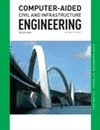
COMPUTER-AIDED CIVIL AND INFRASTRUCTURE ENGINEERING
Innovating Solutions through Computational ExcellenceCOMPUTER-AIDED CIVIL AND INFRASTRUCTURE ENGINEERING, published by WILEY, stands as a leading journal in the domains of civil and structural engineering, computational theory, and computer-aided design since its inception in 1986. With an impressive ISSN of 1093-9687 and E-ISSN of 1467-8667, this esteemed UK-based journal holds a prestigious position in the academic community, reflected by its Q1 ranking in numerous relevant categories, including Civil and Structural Engineering and Computer Graphics as of 2023. The journal is renowned for promoting innovative research that utilizes computational techniques to solve complex engineering problems, making it an essential resource for researchers, professionals, and students alike. Despite its lack of open access options, the journal garners significant interest due to its rigorous peer-review process and high-impact articles, underlining its importance in the advancement of infrastructure engineering practices and technologies. With a Scopus ranking placing it among the top journals in various engineering and computer science fields, COMPUTER-AIDED CIVIL AND INFRASTRUCTURE ENGINEERING continues to foster knowledge and collaboration, ultimately contributing to the future of smart and resilient infrastructure development.

IEEE Open Journal of Intelligent Transportation Systems
Unlocking Potential in Intelligent Transport Engineering.IEEE Open Journal of Intelligent Transportation Systems, published by the IEEE-INST ELECTRICAL ELECTRONICS ENGINEERS INC, stands at the forefront of innovation in the realm of intelligent transportation systems since its inception in 2020. With its open-access format, this journal aims to disseminate groundbreaking research and technology advancements to a broader audience, fostering collaboration and knowledge exchange among professionals in the automotive, mechanical, and computer science engineering sectors. It boasts impressive Q1 rankings in Automotive Engineering, Computer Science Applications, and Mechanical Engineering as of 2023, highlighting its critical role in shaping the future of transportation technologies. The journal's exceptional standing is further evidenced by its Scopus rankings; it holds the 76th percentile in Mechanical Engineering and the 74th percentile in Automotive Engineering, making it a premier outlet for cutting-edge research. Researchers, professionals, and students seeking to navigate the evolving challenges and solutions in intelligent transportation systems will find this journal an invaluable resource.
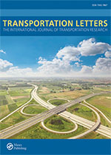
Transportation Letters-The International Journal of Transportation Research
Innovative insights driving the evolution of mobility.Transportation Letters - The International Journal of Transportation Research, published by Taylor & Francis Ltd, is a leading journal dedicated to advancing the field of transportation studies. With an impact factor that reflects its significance within the academic community and a prestigious ranking of Q2 in Transportation, this journal provides a critical forum for the dissemination of innovative research and insights in transportation systems, policies, and technologies. Covering a broad scope of topics from urban mobility to logistics and infrastructure, Transportation Letters serves as an essential resource for researchers, professionals, and students aiming to deepen their understanding of transportation issues facing society today. With over a decade of publication since 2009, the journal has established a solid reputation, ranking 46th out of 141 in Scopus's transportation category, placing it in the 67th percentile. Although it does not operate under an open-access model, it remains committed to accessibility through various subscription options, ensuring that vital research is available to those shaping the future of transportation.